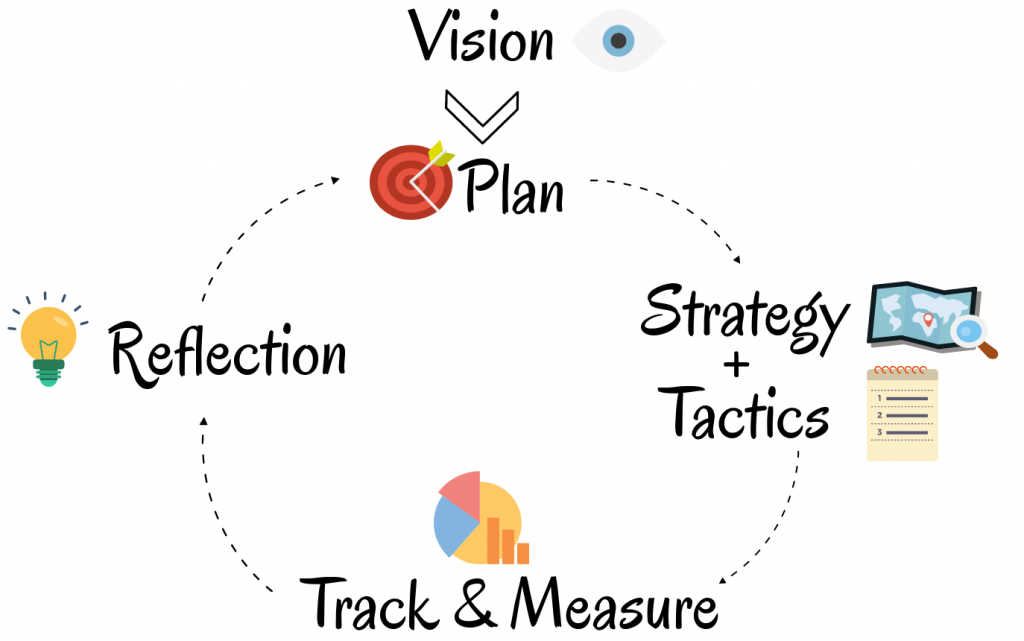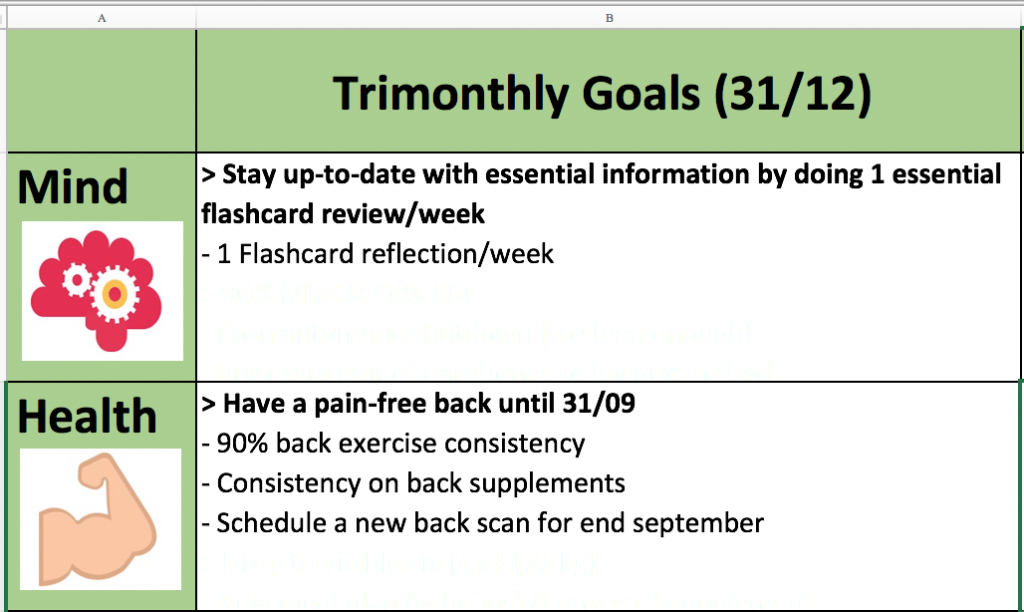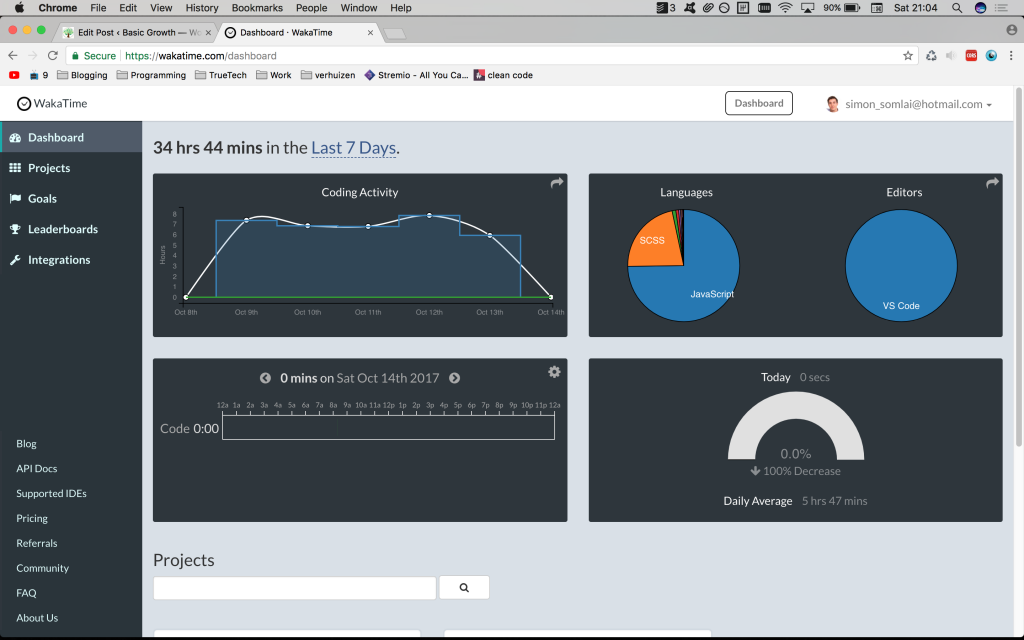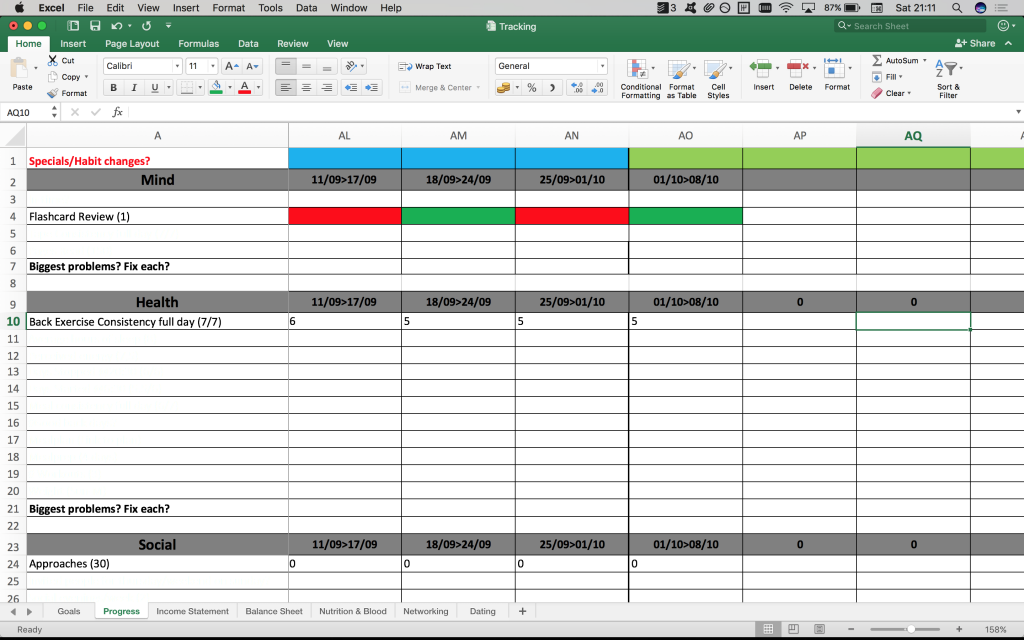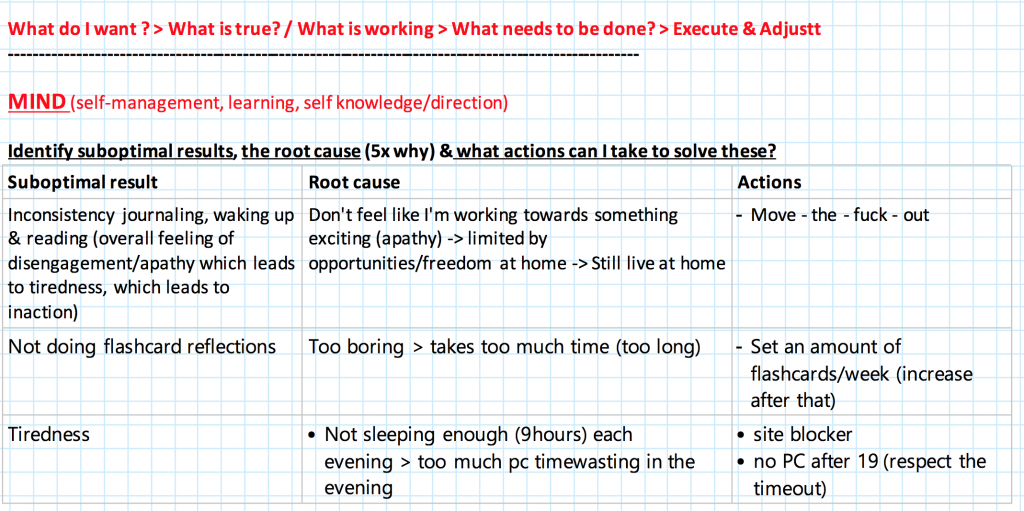“Most people sleepwalk through life, not ever questioning or evaluating the life they’ve build for themselves. Eternally distracted by the next dopamine hit.”
We are currently living in pretty confusing – yet exciting – times.
Every industry is rapidly accelerating, which increases the amount of accumulated knowledge and the complexity of the tools in any field. More knowledge and tools means more (confusing) choices in how to handle our life’s challenges.
Let’s face it; Although more choice allows us to make better ones, there’s just too much confusing crap out there in order to be sure of the actions we’re taking.
So, how do we make our own map to get what we want out of life? And without losing our mind?
How do we keep life simple when the actual reality we try to understand is complex?
————————————————–————————-
A Feedback System For Your Life
I’ve recently reread the book “principles” by Ray Dalio again and watched this talk with Elon Musk and what I saw is that both recommend having some sort of feedback system to get what you want out of life, which i found pretty interesting.
Obviously – being the fucking list-nerd that I am – I assembled as much information about this as possible and made my own version, and that’s what I’m sharing here.
whooptie-doo
I don’t necessarily know if you’re going to find as much use in it as I do (I only think people who share similar analytic/list-thinking personality traits are going to really vibe with it).
But at least I hope I can make you see the value in having a system that enables you to make your own critical life-decisions and that allows you to catch yourself when you’re drifting too far off-track.
But before I write another 4000+ word self-improvement post, I’d like to start with this great quote from Mark Manson;
Our social media culture today is obsessively focused on unrealistically positive expectations: Be happier. Be healthier. Be the best, better than the rest. Be smarter, faster, richer, sexier, more popular, more productive, more envied, and more admired. Be perfect and amazing and crap out twelve-karat-gold nuggets before breakfast each morning while kissing your selfie-ready spouse and two and a half kids goodbye. Then fly your helicopter to your wonderfully fulfilling job, where you spend your days doing incredibly meaningful work that’s likely to save the planet one day. Ironically, this fixation on the positive—on what’s better, what’s superior—only serves to remind us over and over again of what we are not, of what we lack, of what we should have been but failed to be.
We all have our own strengths and weaknesses. But the fact is, most of us are pretty average at most things we do. Even if you’re truly exceptional at one thing — say math, or jump rope, or making money off the black gun market — chances are you’re pretty average or below average at most other things. That’s just the nature of life. To become truly great at something, you have to dedicate time and energy to it. And because we all have limited time and energy, few of us ever become truly exceptional at more than one thing, if anything at all.
We can then say that it is a complete statistical improbability that any single person can be an extraordinary performer in all areas of their life, or even many areas of their life. Bruce Wayne does not exist. It just doesn’t happen. Brilliant businessmen are often fuck ups in their personal lives. Extraordinary athletes are often shallow and as dumb as a lobotomized rock. Most celebrities are probably just as clueless about life as the people who gawk at them and follow their every move.
We’re all, for the most part, pretty average people. It’s the extremes that get all of the publicity. We all kind of intuitively know this, but we rarely think and/or talk about it. The vast majority of us will never be truly exceptional at, well, anything. And that’s OK.
Which leads to an important point: that mediocrity, as a goal, sucks. But mediocrity, as a result, is OK.
All the crap I write on this blog (all the crap that’s being written on the internet really) is great and all. But how can you not constantly feel like you’re doing everything wrong because of it?
I don’t want this post to give you another ‘follow-this-14-step-schematic-or-else-your-life-will-become-miserable’-feeling. Which is something I’ve come to experience with a lot of the self-improvement stuff lately. And I’m sick of it.
I. want. fucking. less.
I want less self improvement information input for more life quality output. I simply want more peace of mind. More bang for my self-improvement buck so to speak.
I ultimately just want a manageable system to keep me on track and correct my course whenever necessary and read some books/follow interesting people on the side. And that’s it.
And that’s all it should be.
Why do you need a feedback system?
I feel like many people spend more time in planning their next vacation than in evaluating their life and constructively working towards goals they’ve set out for themselves. Let alone do this consistently.
Fuck it, most don’t have any clue/care whatsoever where they put their time and energy. And then somehow they wonder why they didn’t achieve their ‘goals’. I’d like to make the following (non-scientific) arguments in favour of having a feedback system;
- Without a long-term plan for your life you’ll fall into destructive short-term thinking by default (seeking stimulation and sedation). A feedback system forces you to ask the right questions – which forces your brain to run a “script” instead of humming along on its default setting. (is your life by design or by default?)
- With a clear vision you’ll always know the best use of your time and energy so you won’t get trapped in “other people’s agenda” and keep working towards a life you want. It’s like a filter for where to best spend your time/energy/money (three most valuable resources).
- It allows you to clearly measure your progress/achievements over time which – in retrospect – add tremendous value to your life. (measurable, progressive growth is a big factor for happiness)
- It gives you the feeling that you’re actually going somewhere and that your days matter. A sense of engagement in life as a gladiator instead of watching it ooze by as a spectator. Life overall feels more “sorted out” and you have more trust in your ability to catch yourself when things get hard (self-reliance).
I’m not saying you need to use my feedback system. I’m saying you should build/make one that works for you.
How does my feedback system work?
Here’s a video explaining how I do it and a write-up that goes into some more detail of each aspect;
Here’s the planner I use
1) Vision
My feedback system basically starts by envisioning how you want your life to look like ideally in all areas. The long-term, big-picture view. This is completely made up and nothing should be filtered out. It’s not the intention to ever reach this, just to keep aiming for it and continuously working towards it. Remember;
That mediocrity, as a goal, sucks. But mediocrity, as a result, is OK.
Write one day-in-the-life story from waking up to going to bed. Use the 5 area’s of life if you have to. Make up your own area’s if you feel especially creative. Here’s some things I cover in my day;
- Mind: How would your ideal mindset be? How would you behave. How would the world look like trough your eyes?
- Health: What do you want your ultimate physical health to be? How do you want your body to look like? How much energy do you want to have?
- Social: How do you want your friendships, family relations and love life to be?
- Wealth: How do you envision your ultimate financial situation?
- Fun/Meaning: What kind of fun experiences do you want to do in your life? What would you do to relax from the daily struggles of life? How would you combine your skills and interests to leave your mark on this world
I’ve read before that ‘how big you think becomes the launching pad for how high you achieve, but I haven’t necessarily experienced a correlation in that. I have – however – experienced a correlation between higher goals and higher disappointment. Happiness equals expectations minus reality right?
Overall I feel goals should be big and unfiltered though.
Practical
- What does your ideal life look like? The house you live in, the body you see in the mirror, the girl you wake up to, the sun shining through the window, the scent that fills up your living room.. . Basically: Establish an ideal vision of what you want your life/you to look like.
2) Plan (What?)
Setting Goals
Life questions should be specific. That’s why I divided mine into these 5 areas;
- Mind (self-management, learning, self knowledge/direction)
- Health (Looks, training, nutrition & recovery)
- Wealth (creating, growing, buying)
- Social (friends, dating, family)
- Alive (excitement & meaning)
You don’t have to use these, but just remember that settings goals for your life needs to be specific and these 5 area’s help to keep a nice overview.
Try to see in each of the 5 areas of your life where you’re at right now. Then, project three months into the future. Based on your long-term vision you’ve set out in the previous step, what are some tangible outcomes that will make a serious dent in your life quality?
I used to be a huge fan of yearly and monthly goals, but over time they just appeared a lot less important than the quarterly ones.
If you knock down the quarterly goals, the yearly dominoes will tumble as well. I’ve found 3 months or 90 days the ideal timespan that’s long enough for achieving relevant goals and simultaneously short enough to keep your targets accurate/realistic.
Here’s what you should do;
- Set product goals (something you can point at) for tangible outcomes
- Set process goals (something you can do consistently) for intangible outcomes.
For example; (The bold text, those are my goals);
These end-goals don’t necessarily have to be things that are directly under your control. The most rewarding life achievements almost never are. And that’s okay. So; getting a job in
However – the way you choose to measure progress towards these goals (step 5) should be directly under your control (I’ll get back to that later)
Selecting Goals
Now if you’re ambitious you probably have A LOT of ideas about how your ideal life would look like.
I know I did.
But see, clarity doesn’t come when EVERYTHING needs to get done or when your to-do list runs endlessly. Therefore we’re going to reduce ALL your quarterly goals to your top three – five that will have the MOST IMPACT on the quality of your life in the next three months (Be sure to make these VERY SPECIFIC).
The less goals, the more chance you’ll achieve them.
I’m actually really fucking serious about this. You only get to pick 3 – 5, the fewer the better and the higher chance you’ll achieve them. THIS SELECTING PROCESS SHOULD BE PAINFUL/DIFFICULT.
the greatest barrier to achieving your goals is the other goals you have. In other words, your goals are competing with one another for your time and attention. Whenever you chase a new goal, you have to pull focus and energy from your other pursuits.
When you’ve selected, ask yourself; If I achieve the following 3-5 goals, would my life be significantly improved/be happier?
Discard all the rest (put them on a list in your onenote to evaluate next quarter or put them in white color in the spreadsheet so you don’t see them. To be achieved in another quarter). Don’t make them secondary nor try to pursue them in your ‘spare time’. Remove them totally from your list.
I want you to get what you want out of life – just realize it can’t be done at the same time. You have to understand that each of the following undertakings require a SHITLOAD of TIME, ENERGY, MONEY (most valuable resources) to see it through;
- A great physique and 24/7 energy
- A well-paid, enjoyable job without having to sacrifice other major parts of your life
- A well-paying, enjoyable business without having to sacrifice other major parts of your life
- (A) hot girlfriend(s) and great sex
- Good close friends to share life experiences with
- A place to call home (with your family)
- Variety of fulfilling experiences (traveling the world, learning an instrument, athletic achievements, …)
- A giant penis
Scratch that last one, that might just be me :/.
Read The Four Burner Theory and Warren Buffets 2 List Rule about this to better understand the necessity of focusing down on less in order to achieve what you want. They really accompany this post well.
Practical
- What are 3-5 product/process goals that will significantly improve your life quality over the next three months?
3) Strategy (How? -> Long term)
So now we’ve established the “what”-part. You’ve got 3-5 big, shiny new goals that would actually make a decent dent in your life quality if you’re able to achieve them.
Great.
Now we’re going to move into the “how”-part. This is the most difficult and the most important. Goals don’t mean shit without a plan of action where you regularly track your progress and correct your course of action (hence why it’s called a feedback system – duh)
That said, you can never really know exactly which actions will take you to your desired end-goals. The best way to do this is to simply weigh-off your options and guess the highest-leverage actions you can take to reach your goals.
Yup, I said guess.
Not count/measure/analyse but simply make an educated guess.
Here’s what I’ve come to realize in my life;
The more I read books, follow courses and listen to other people the more I realise everyone has just one small part of truth and never a complete roadmap to give me exactly what I want. In the end, the only thing I’ve come to trust is my own critical mind. No-one can ultimately tell you what the best use is of your time and energy.
There is no recipe. There is no guidebook. There is no plan. You’re on your own for lifes’ hardest challenges. And no matter what quantity of books you read, advice you follow, seminars you take (you should do these things however). Nothing but experience and your own critical mind can give the answer to your life’s most important questions.
So what I would recommend to reach your goals is to just take your most educated guess by analysing your situation and copying what others who have you want are doing. Trust in the process and adjust it as you learn more about the topic.
That’s said, there are some ways to make a better educated decision and not screw up your life in major ways (I believe it’s very easy to do so)
Finding Solutions
The system I use to find solutions for my problems is called WIGWAM. Whenever you want to find a solution in order to reach a goal. You have to consider the following steps;
- Watch (What are the factors that influence this part of my life? What am I currently doing that’s working/positive effect and that isn’t working/negative effect?)
- Ideate & Guess (What are from my understanding, the existing options to improve this area?
- Brainstorm to find all the existing options
- Look at others who have achieved what you want and how they did it
- Incubate when the answer isn’t immediately apparent
- Which? (Pick top three and execute on this!)
- Apply & Measure (discussed in point 4 & 5)
Whenever I have a big question in life I usually get out a big piece of paper and write a specific question in the middle of it and try to anwser it through a method of self-elicitation and write down as many options as I can.
I believe that this creative process of asking yourself questions (whether verbally/written) and generating ideas is singlehandedly the most important step in solving your own challenges. Here’s what you should do;
- Writing a specific well-defined question in the center of a piece of paper that aims to solve one of your life’s more urgent problems/find a way to reach your goals.
- Brainstorming about the possible options and looking at how others got the result you desire.
- Making your best guess of the top three actions and deciding on a course of action.
- If the answer doesn’t come during the brainstorming session, continue with other activities and leave it for your unconscious to process further. (incubation)
The experience of leaving a problem for a period of time and then finding that the difficulty evaporates on returning to the problem, or, even more striking, that the solution “comes out of the blue” when thinking about something else, is widespread.
Ray Dalio (you should read his book ‘principles’) summarises this process as;
What do I want ? > What is true? / What is working> What needs to be done about it? > Execute & Adjust
After you’ve gone through this process you will now have about 5 or less clearly defined goals for the next three months, each having 3 or less strategies. This is the basis of my feedback system.
Now all that remains is dividing these into weekly/daily actions and track your performance on those to-do’s. (step 4, 5 & 6 -> the actual actionable part of the system).
Practical
- For each goal you’ve outlined in the previous part, what are the available options to accomplish these?
- Who has achieved this result you want and what did he/she do? What resources can I consult to learn about solving this problem?
- Which of these possible strategies seems to be the most likely to get me what I want the fastest?
4) Tactics (How? -> Short term)
From this point onwards, we distill our tactics into weekly and daily tasks. The smallest building blocks for reaching our goals.
In the past I used a weekly paper planner to further divide my goals into weekly actionable points but lately I’ve been favouring keeping a weekly todoist app.
This way, my whole feedback system is completely digital, portable and accessible from any place. I personally just use the todoist desktop app for my mac where I create the weekly tasks and recurring habits (gym, cooking, …) and during the day I cross them off on my phone!
Desktop app
Mobile app
Prioritisation & efficiency
So now you’ll have filled up your week with a load of high-leverage activities. So how do we efficiently do the actual work, and in which order?
There’s only one thing at a time that should get most of your focus. Problems in life should come one by one, just like only one grain of sand can pass through an hourglass at a time.
Plan your ONE highest-leverage activity first thing in the morning and execute it until it is done. Everything else besides that ONE THING is simply a distraction. For me currently, that’s mostly always the recurring 5 hours of deep work (aka programming). I knock that domino off first thing in the morning, almost every day.
Be relentless in this. Most every day of most every week you should be pushing your mind to grapple with activities which dramatically impact your life quality. Leave the socially conformed mindset of artificial busyness, email compulsion and social media posturing.
This means;
- NO email checking before it’s done
- NO Facebook/twitter/instagram/…
- NO People interrupting
- NO Phone alerts/calls
When I’m at home, I mostly work in a darkened room with the door locked, staring at a blank wall and having earphones in.
Also;
Take advantage of parkinons’ law by reducing the time available for your work by setting an endtime/shutdown routine every day (which forces you to limit your tasks to the essential) & use paretos law to limit tasks to the important (so you do less tasks in a day).
I highly recommend reading the book ‘Deep Work’ by Cal Newport and ‘The One Thing’ by Gary Keller to learn about focus and prioritisation respectively.
Practical
- What’s currently the most important thing you should dedicate the most amount of your time to?
- Which 20% of actions will get you 80% of the desired results in goal x? (pareto’s law)
- At what hour will you stop working in the evening? (parkinson’s law)
5) Track & Measure
Off-course just checking boxes every day isn’t going to make a difference in an by itself. It should be quantified according to some clearly defined metrics/targets. These should be your ‘key performance indicators’ (KPI) that give you an idea how well the previous steps of your feedback system are working.
For each goal you’ve set, you’re going to pick a value/metric (max 3 objective ones) to keep track of your progress/action taking on that specific goal. These should be directly under your control and objective. For example;
- # of approaches/week (dating)
- hours of deep work (wealth)
- hours of sleep (health)
- number of clean meals/week. (health)
- pages read/week (mind)
NOT: a feeling/happiness scale (subjective/open for interpretation), #of phone numbers in pick up (not directly under your control)
I basically fill-in this excel sheet once every week on sunday where I add the number/boolean for the KPI. Like so;
Practical
- What are 3 (or less) objective, directly controllable KPI/metrics you can use to track your progress for each of your goals on a weekly/daily basis?
6) Reflection & Correction
After I’ve completed the tracking sheet on Sunday I also go over my weekly reflection section in onenote. Which is basically two-sided;
- A root-cause analysis of the suboptimal results I’m having in reaching my goals
- A list of questions I ask myself every week to keep myself on course and refocus on my problems/goals.
Root Cause Analysis
It’s basically a table where I identify any suboptimal results I’m having for any goal I’ve set, then asking a 5-fold why question (asking ‘why’ this suboptimal result occurred repeatedly) to get to its root cause and then just re-implement the strategise/brainstorm part to find new solutions/alternatives to overcome this root cause.
It’s pretty straightforward and majorly effective for correcting your course of action;
Reflection Questions
I basically keep a set of reflection questions for each area of my life that I go over regularly (about once a week) that make me think deeply on how I choose to live my life and evaluate on a higher, bigger-picture level on how I can improve my results. Josh Kaufman has some too.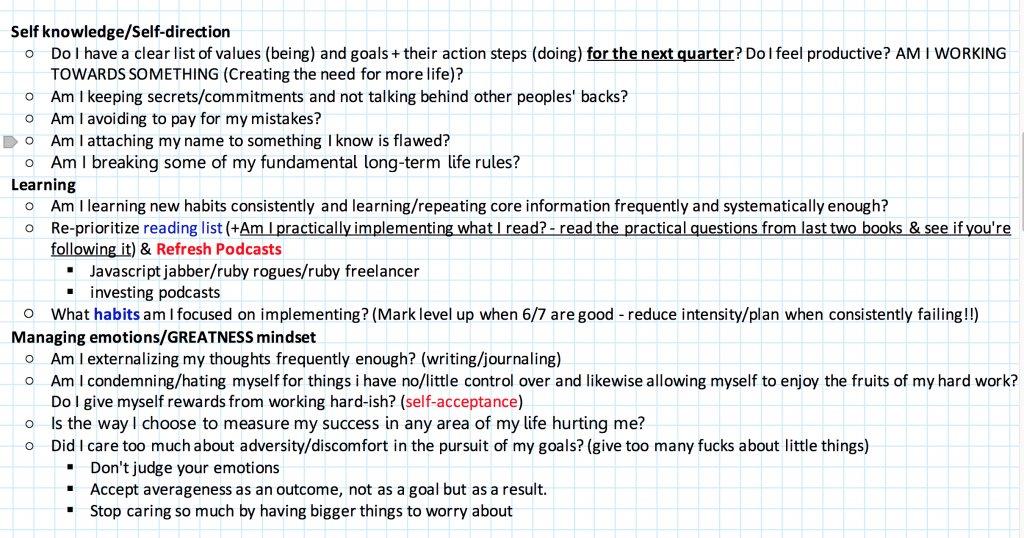
Here’s a full list of all the questions I ask myself on a weekly basis. Note that these are tailored to problems I personally encounter a lot and shouldn’t just be blindly copy-pasted.
Practical
- What are the suboptimal results you’re currently experiencing in achieving your goals?
- Why do you think you are experiencing these suboptimal results? -> Why is that? -> Why is that? –> … (5x)
- Repeat step 3 for finding new solutions for the root cause.
- What are some reflection questions you can ask yourself on a weekly basis?
The feedback loop has now been completed! Congrats!
Extra Considerations
Can we have it all? (s****elf-improvement vs self-acceptance)
Can we have a ripped six-pack, have our bank account resemble a phone-number whilst making plenty of time for family/friends and great relationships. And – oh yeah – not lose our minds in the process?
I feel like it’s incredibly difficult and most will never achieve it, but still possible to pull off (contrary to what Mark Manson said/believes in his quote). I feel like this guy has pulled it off (and there are probably others, but those are the exceptions).
I’ve been following him on-and-off for a while and I feel like he’s a bit the figurative Bruce Wayne of self-development since he incorporates all the lessons to a T. Visualisation, goal setting, reading, meditation, cleansing, gym, cooking, … . You name it.
He’s created an extraordinary life for himself in all areas from the looks of it. (You never truly know however)
- Massive financial success with a dozen or so income streams
- Solid health, looks & energy
- Hot, intelligent girlfriend
- Great place to live
People who (seemingly) have achieved a lot more than you make you wonder where you’ve spent your time and makes you think you’re doing something wrong.
Then again, I feel it’s useless to keep condemning yourself for everything you haven’t yet achieved. It makes your life miserable when you only allow yourself to feel as valuable as your latest achievement. Hence why I included the quote from Mark in the beginning of this article.
I feel you should strive for a better life every single day and work consistently and diligently towards it, but also cultivate the ability to let it go when things don’t work out as you expected.
Yes, we can have it all. But we’ll highly-likely never reach it.
And that’s okay.
What’s a good life supposed to feel like? (doubt)
Second thing I still wanted to address is how it’s supposed to feel when you’re climbing towards your goals and making small improvements.
See, when I first got my career in web development started, I felt really out of place and nervous that people would think that I’m some kind of fraud. When the worst of that passed and I became more comfortable talking about the technical subjects and gaining more experience, I started immediately thinking about the next steps to take to improve myself.
Never really absorbing the fact that getting a career started with a lot of future potential had significantly impacted my life quality. The result I actually had been striving towards for 9+ months. I kept feeling like there’s still so much shit that needed to be done.
I’ve realised that we will always have problems. No matter how ‘good’ our life gets. In growing we simply interchange these with new, slightly better problems.
Just like there’s no map, there’s no marked endpoint.
A good life should actually feel like a semi-constant hassle where you’re continuously fixing problems, achieving goals, being frustrated when you don’t and afterwards briefly enjoying your upgraded problems. It’s not supposed to feel all great, awesome, rainbows-coming-out-of-your-ass-ecstatic.
And that’s also ok.
Essence
It all looks more complicated than it really is. In the end it’s just a way to keep yourself and your stupid brain on track.
Once you get in the habit of it, you’ll ask yourself how you ever did without (or at least I did, but then again I’m a pretty big control freak. You might have noticed). Here’s the gist of it though;
- Make a day-in-the-life story of your ideal day.
- Set 3-5 specific goals for the next three months.
- Brainstorm/research about the strategies you can use and pick three you’ll be using the next quarter
- Then break it down in actionable steps on a weekly & daily basis (I recommend using todoist)
- Set max 3 KPI for each goal to track your progress towards your goal on a weekly basis.
- Do a weekly review where you analyse/backtrace the suboptimal results, the root cause and brainstorm about improved strategies. Maybe ask yourself some additional life questions too.
That’s it.
Note that I’m not forcing/arguing my feedback system on anyone. I just want you to know that it exists, that it can be helpful and it’s an option to consider in improving your life.
There’s MANY other systems and mine is like all others a growing process from +-3 years of adjustments. In a year or three, it’ll probably be more fine-tuned. Just like it improved from 3 years ago or the year before that.
If you have any questions about anything discussed in this article, ask them below. I’ll respond to every question within a week.
If you have any improvement suggestions for this feedback system or a better alternative, be free to link to them or otherwise explain the improvements. I’m VERY interested in this.
Take care,
Simon

